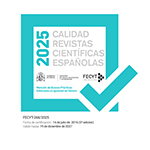Standardizing the nation? Conscription during the Francoism
Abstract
A state of the art regarding the issue in which some interpretative proposals will be presented. The role that the army has developed as a nation building agency has been largely referred to the experts of this area of knowledge. However, there is still a lack of research focused on this issue, especially on the 20th century. As far as our country, Spain, is concerned, this field of investigation has been limited to some researches which focused on the 19th century and on Miguel Primo de Rivera’s dictatorship. This paper deals with the main features of the Spanish compulsory army service during the period of Franco’s dictatorship, and tries attempts to analyse the role that this phenomenon played in the process of Spanish nation building, and in the creation of Spanish national identity: the definitive universality of the service, the combination between theoretical and practical training, Spanish history learned by recruits and the literacy lessons. Yet, not only is this the main purpose of the essay, since it also aims to depict the lack of specification in the theoretical teaching, the discrimination that the recruits suffered based on their geographical origin, and the influence of other conscripts with different national identities. Finally, we question some aspects of the conscription’s nation-building capacity.Downloads
Article download
License
Aquellos autores/as que tengan publicaciones con esta revista, aceptan los términos siguientes:
a. Los autores/as conservarán sus derechos de autor y garantizarán a la revista el derecho de primera publicación de su obra, el cuál estará simultáneamente sujeto a la Licencia de reconocimiento de Creative Commons Reconocimiento-No comercial-Sin obra derivada 4.0 España que permite a terceros compartir la obra siempre que se indique su autor y su primera publicación esta revista.
b. Los autores/as podrán adoptar otros acuerdos de licencia no exclusiva de distribución de la versión de la obra publicada (p. ej.: depositarla en un archivo telemático institucional o publicarla en un volumen monográfico) siempre que se indique la publicación inicial en esta revista.
Plagio y fraude científico
La publicación de un trabajo que atente contra los derechos de propiedad intelectual será responsabilidad de los autores/as, que serán los que asuman los conflictos que pudieran tener lugar por razones de derechos de autor. Los conflictos más importantes pueden darse por la comisión de plagios y fraudes científicos.
Se entiende por plagio:
1.Presentar el trabajo ajeno como propio.
2.Adoptar palabras o ideas de otros autores sin el debido reconocimiento.
3.No emplear las comillas u otro formato distintivo en una cita literal.
4.Dar información incorrecta sobre la verdadera fuente de una cita.
5.El parafraseo de una fuente sin mencionar la fuente.
6.El parafraseo abusivo, incluso si se menciona la fuente.
Las prácticas constitutivas de fraude científico son las siguientes:
1.Fabricación, falsificación u omisión de datos y plagio.
2.Publicación duplicada.
3.Conflictos de autoría.












